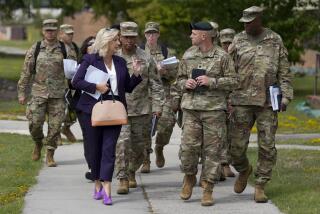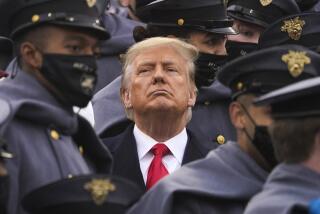Pentagon to hold a stand-down and review recruitment screening for extremism after U.S. Capitol attack

- Share via
The Pentagon is reviewing how to improve screening of military recruits to eliminate extremism in its ranks after the riot at the U.S. Capitol served as a “wake-up call” when members of the military were discovered to have participated, a defense official said.
The services screen roughly 500,000 applicants each year who seek to join the military, of which about 200,000 enter as new recruits.
Defense Secretary Lloyd J. Austin III directed the review Wednesday during a meeting with all of the military service chiefs to get a better understanding of how deep extremist views may have infiltrated military ranks, and to begin to look for options to root them out.
“Changes to recruit screening did come up,” Pentagon Press Secretary John Kirby said in an interview with McClatchy. “Every service did it differently. One of the things that was discussed was when and to what degree do we assess people” for connections to groups with extremist ideologies, he said.
Austin’s review will also require all of the military services to hold a “stand down,” which is usually a day or more when training activities and other activities are rescheduled to make time to hold focused group discussions on a topic of concern.
The review was prompted by the violent attack on the U.S. Capitol on Jan. 6 and subsequent arrests that revealed current or former military service members participated.
“It was a wake-up call,” Kirby told reporters at a briefing. “January 6, I think, really not just shocked the nation, but it certainly had an electric effect here at the Department of Defense in terms of the notion that anybody active duty, let alone in the veteran community and active duty, could be involved in that.”
Once someone has entered the military, their off-duty actions or public comments are more restricted and violations of military code can affect their career.
For example, Marine Corps Lance Cpl. Vasillios Pistolis was court-martialed and ousted from the Marine Corps in 2018 following his participation in the deadly alt-right protest in Charlottesville, Va., the previous year, said Marine Corps spokesman Capt. Joseph Butterfield.
A potential recruit, however, is in a different category, Kirby said.
“Until they sign on the dotted line, they are private citizens and there are limits to what the military can do,” he said. “Membership alone is not disqualifying” because of 1st Amendment rights to consider.
“The secretary wants to see what kind of policy changes are possible, legal and effective,” Kirby said.
If the United States labels some of the groups who participated in violence in the U.S. Capitol as terrorist organizations, as Canada did to the Proud Boys this week, that could simplify some of the screening, said retired Army. Col. Jeffrey McCausland, a visiting professor of international security affairs at Dickinson College in Pennsylvania.
“Until you identify very specific organizations — Proud Boys, Three Percenters, Oath Keepers, whatever, as being extremist to the point that you know membership in this organization precludes you from joining the military, or could compromise your current enlistment in the military — until you make it that black and white, it becomes very, very difficult,” McCausland said.
Defense Department directive 1325.06, which was last updated in 2012, says that military personnel must not participate in groups “that advocate supremacist, extremist, or criminal gang doctrine, ideology, or causes; including those that attempt to create illegal discrimination based on race, creed, color, sex, religion, ethnicity, or national origin; advocate the use of force, violence, or criminal activity; or otherwise engage in efforts to deprive individuals of their civil rights.”
It defines participation broadly, including rallying, organizing, getting a group’s tattoo, fundraising and “distributing material (including posting online).”
But it will still be an uphill battle for the Pentagon, McCausland said. “Last time I checked, I think the [Southern Poverty Law Center] had like 900 different right-wing groups across the United States. So do you label all 900 as extremist?”
More to Read
Get the L.A. Times Politics newsletter
Deeply reported insights into legislation, politics and policy from Sacramento, Washington and beyond. In your inbox three times per week.
You may occasionally receive promotional content from the Los Angeles Times.










